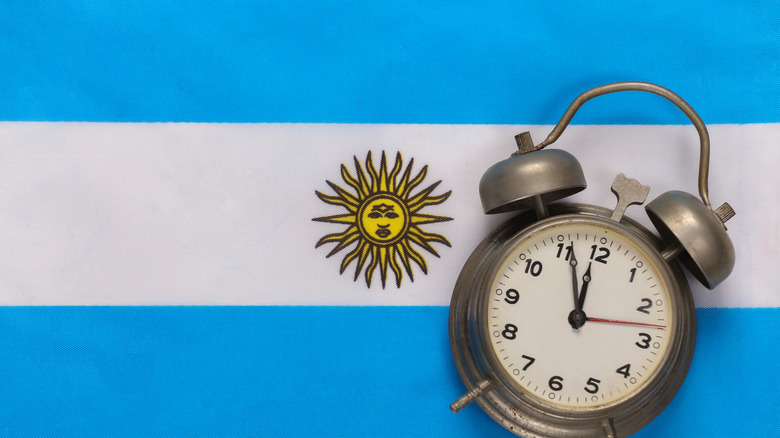Why Being Early In This South American Country Will Make You Look Like A Total Tourist
In the vibrant world of South American cultures, each country boasts unique customs and social etiquettes that define its identity. Argentina — the land of tango, rich wines, and breathtaking landscapes — is no exception. But one aspect of Argentine culture catches visitors by surprise: its distinctive concept of time. In Argentina, arriving early for an event or even on time will make you look like a total tourist, and also, it's deemed rude!
As you wine and dine your way through Argentina, you'll notice that the country operates on a schedule that might seem relaxed or even bewildering to visitors from more punctual cultures. It's not that clocks don't exist or that Porteños (local Argentines) don't know how to follow them — it's the culture around time that is different. Here, time is fluid. This laid-back approach is deeply ingrained in the country's culture and reflects the Argentine's philosophy on relationships and enjoying life without rush. So, how late are we talking here?
One of the most striking examples is dinnertime. In many countries, dinner might be served around 6 p.m. to 8 p.m. However, in Argentina, dinner starts at 9 p.m. (or even later!), with guests typically arriving past the stated time. Arriving on time, or worse, early, can indeed make you look like a tourist unaccustomed to the local ways. Plus, you'll be the only one in the restaurant (along with other clueless tourists). Moreover, dinners go on for hours, and food service tends to be slow and leisurely.
Fashionably late: the Argentinian custom
Arriving late extends beyond dinner and applies to parties and social gatherings. It's almost a given that these events start half an hour to an hour later than invited. Showing up early can mean waiting alone or catching your hosts unprepared. Concerts, plays, and organized public events usually start 30 minutes later than stated. Nightlife, you guessed it, also late. Nights of drinking and clubbing usually begin at 2 a.m. and end at 5 a.m. at the earliest. Bars only start buzzing with night owls at around 1 a.m.
While the flexible approach to time is prevalent in social settings, professional and business environments in Argentina adhere a little closer to schedule. However, even in these contexts, a slight delay is often tolerated and understood as long as the latecomer informs the other party. If a business meeting involves foreigners from other countries, Porteños typically adapt to more punctual international standards.
In a nutshell, casual social settings have more relaxed timing rules, while professional business settings have more semi-strict timing rules. If you're invited to a party and arrive an hour late, it's fine. However, if you're an hour late for a job or formal occasion — not good. If you arrive an hour late to a beach gathering with a large group, it's fine because they will be busy doing something fun even if you're not there. However, if you're an hour late to a dinner with only two other people, that's a different story.
How to avoid being early and embrace lateness
This fashionably late attitude has deep roots in Porteño culture. It's all about enjoying quality time with loved ones rather than perceiving time as something to spend, lose, or gain. Understandably, the perceived lack of punctuality can be unsettling for travelers and even expats or remote workers living in Argentina. The reassuring truth is that tardiness is not impolite or abnormal. It also means no disrespect or lack of care for the relationship.
For tourists, adapting to this can be both a challenge and an opportunity. It's a chance to slow down, embrace the local way of life, and enjoy the moment. To navigate the Argentinian timing culture, the main thing you must do is embrace flexibility, Porteño style. Allow your schedule to be flexible and open to adjustments. This mindset will help you enjoy Argentina's laid-back pace without stress.
If you're unsure about the timing of an event, don't hesitate to ask your local friends or hosts about the expected arrival time. They'll appreciate your effort to adapt and provide guidance. Note that Argentina uses military time. So, dinner at 9 p.m. is actually dinner at 21:00. If you find yourself waiting, use the time to observe local life, enjoy a drink, or simply relax. Knowing that gatherings may start later, plan your days to accommodate late nights. Maybe take a siesta (afternoon nap) or plan a lighter schedule the next day. Remember, you're on Argentina time!


